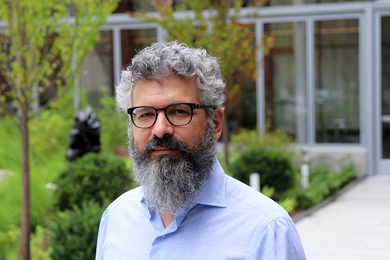MIT faculty recognized the need for a communications requirement for undergraduates and approved a proposal that the School of Engineering offer a master's degree in logistics in motions adopted at the March 19 meeting.
Both motions will be voted on at the next faculty meeting on April 16. The March meeting, attended by about 70 faculty members, also included an update on the reengineering of student services.
The need for a communications requirement was suggested after the Special Committee on the Writing Requirement (CWR) found that the program established in 1982 was inadequate. The motion, proposed by Professor Lawrence S. Bacow of urban studies and planning, chair of the faculty, calls upon the Committee on the Undergraduate Program (CUP) to conduct experiments and create models before reporting back to the faculty with its recommendations for the new program by the spring of 2000.
"We have a fundamental problem that we have to fix," said Professor Kip V. Hodges, dean for undergraduate curriculum, who chaired CWR. Professor Hodges noted that the National Science Foundation had already committed $200,000 to CUP for its research.
A six-month study conducted by CWR revealed that 25-30 percent of juniors surveyed had inadequate writing skills and another third had only marginal abilities. All had passed Phase One of the requirement adopted in 1982 that was intended to establishing basic writing competency. CWR discovered no correlation between grade point average and writing ability.
In addition, MIT seniors majoring in science and engineering in 1994 lagged behind their peers at Cornell, Harvard, Rice and Johns Hopkins in reporting that their writing and speaking skills had improved during their college years.
While "heartily endorsing" the CUP experiments, Professor Arthur C. Smith of electrical engineering and computer science, former dean of undergraduate education and student affairs, was concerned that time and energy devoted to improving writing skills would come at the expense of the commitment to developing problem-solving techniques.
"We believe better communications skills are an amplifier," said Professor Bacow.
The motion says: "Specifically, the Faculty believe that the ability to write, speak and communicate clearly should be an essential part of an MIT undergraduate education." Associate Professor Charles Stewart of political science, CUP chair, said, "It is absolutely critical to engage the entire faculty."
Warning that writing skills should not be equated with speaking skills, Professor David Thornburn of the literature section welcomed the attention to the subject "with great applause and relief," although he was critical of the motion's construction.
He suggested that redundancies be deleted and noted that the phrase "receive practice" was ungrammatical. Professor Bacow said he would "polish up" the language and return with a revised motion in April.
"My editorial pencil will be available at the next meeting," Professor Thornburn responded.
LOGISTICS DEGREE
The motion to establish a Master's of Engineering in Logistics degree was proposed by Professor Yossi Sheffi, director of the Center for Transportation Studies, which would administer the program. The intensive one-year regimen would require students to work in small groups on projects under the supervision of a faculty member. The initial group of 10 students would matriculate in 1998. After five years, the program is expected to grow to 60 students.
Both the Online Student Information Services and the Student Services Center have been updated and enhanced as part of the reengineering program, reported Professor Martin F. Schlecht of EECS, captain of the Student Services reengineering team.
"We will deliver student services more efficiently and much more effectively," said Professor Rosalind H. Williams, dean for undergraduate education.
A version of this article appeared in MIT Tech Talk on April 3, 1997.





